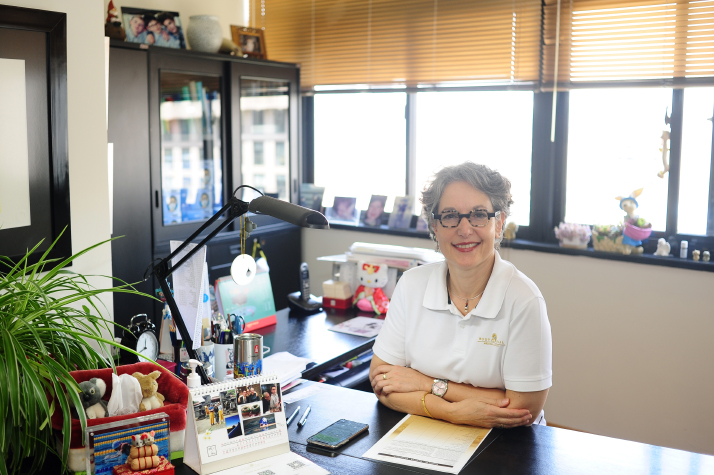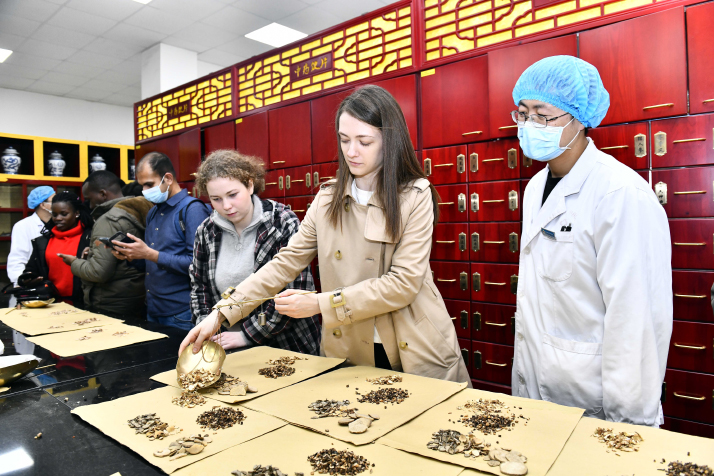| World |
| German physician finds fulfillment in Chinese medical practices | |
|
|
 Doris Rathgeber at a clinic she founded in Shanghai on May 13, 2020 (COURTESY PHOTO)
She wears a white coat, speaks fluent Chinese and diagnoses patients with the assistance of traditional Chinese medicine (TCM). A German physician working at the Body and Soul Clinic in Shanghai's Huangpu District, Doris Rathgeber, born in Düsseldorf in 1966, has been familiar with TCM for more than 20 years. She has practiced mainly in Shanghai and dedicates her professional life to promoting China's centuries-old medical system around the globe. She came to Shanghai in 1995 when her husband started a business there, and studied Chinese for two and a half years in order to talk with the locals. One day, a friend told her about TCM, which became the catalyst for her subsequent enrolment in an internal medicine program at the Shanghai University of Traditional Chinese Medicine. Looking back, Rathgeber admits that she encountered quite a few difficulties. She struggled to jump the linguistic and cultural hurdles thrown up by the highly intensive program. As a foreign student, TCM theories, the ancient classical texts and their wording, herbs and herbal formulations all proved huge challenges. "I failed my first exam on herbs by getting only 40 out of 100 points." Following that mishap, she started burning the midnight oil, inundating her teachers and classmates with questions, and reading German books about TCM. Step by step, through much patience and persistence, she managed to catch up with her classmates. After graduation, Rathgeber, together with several friends, founded a clinic in Shanghai and she has been working as a TCM physician ever since. Today, she is fluent in ancient Chinese medical texts such as the Inner Canon of Huangdi (Huangdi Neijing) and Treatise on Febrile Diseases (Shanghan Lun) and can make her own diagnoses. She is also well-versed in Chinese medicinal formulas and acupuncture points that are foreign even to many Chinese. Rathgeber has been treating a wide range of acute and chronic diseases since 2004 through her proficient combination of TCM and Western medicine. She also gained extensive experience in treating gynecological disorders. Today, she has established a total of four clinics across Shanghai.  International students from China University of Petroleum learn about Chinese medicinal herbs during a visit to a hospital in Qingdao, Shandong Province, on April 23 (XINHUA)
A labor of love As an experienced TCM physician, Rathgeber is in an authoritative position to comment on the differences between TCM and Western medicine. She said Western medicine focuses on the disease itself, while TCM is a millennia-old art of healing that regards the human being as an integral whole, with its roots in Chinese philosophy. "In TCM, we use philosophical theories that are completely unknown to Western medicine, such as the five-element theory (wood, water, metal, earth and fire), the two 'opposite poles' of yin and yang, and qi, or energy. For chronic diseases and those that are difficult to treat using Western medicine, TCM can be a highly effective healing method," she added. TCM is a precious treasure and a crystallization of the 5,000-year-old Chinese culture. Its preservation and popularization have been a priority for the Chinese Government. President Xi Jinping has called to place equal importance on traditional Chinese and Western medicines and make efforts to enable them to supplement each other and prosper together. He also underlined the importance of efforts to promote TCM internationally and fully develop its unique strength in preventing and treating diseases. In 2016, a five-year plan for the development of TCM in other participating countries was made part of the Belt and Road Initiative, with the aim of strengthening international exchanges and cooperation in this sector. Rathgeber describes the TCM initiative as "a right decision" and has kept her fingers crossed for its successful rollout. "This is a good way to spread more information about Chinese medicine overseas and allow foreign patients to receive TCM therapy," she said. Although TCM itself is accepted in Germany, the people do not know exactly what it includes. Rathgeber finds this to be a sorry state of affairs. Germans are perhaps most familiar with acupuncture, as well as acupressure and herbal therapy. "However, they don't understand what's behind the herbal therapy," she explained. In fact, in addition to acupuncture, TCM treatments also include medicinal herbs, nutrition, exercise therapy and massage. In Rathgeber's opinion, it is important to explain TCM with modern science and to publicize it, to present its theories transparently and simply. "To achieve the internationalization of TCM, we must first better explain its basics. In my opinion, new explanatory models have to be developed." In addition to her clinical practice, Rathgeber also gives wide-ranging lectures on TCM, which target foreigners in Shanghai. She is wholeheartedly committed to expanding awareness about and acceptance of TCM. "I will always continue to support and interpret TCM," she said. A changing city After 26 years in China, Shanghai is Rathgeber's second home. When she first came to Shanghai, she found it difficult to cope with the overall change: the language barrier, the culture shock, and the combination of it all. Within the first six months, she felt tempted to "flee" Shanghai and return to Germany on several occasions, but today she likes to refer to herself as a "new Shanghai woman." "All I have, comes from China. China has helped put my past behind me and find an opportunity to make my dream come true." Growing up in Germany, Rathgeber had always wanted to become a doctor. Yet when she turned 13 and her mother died, this to her meant there would be "no more room for dreams." After completing a vocational training program, she forged a successful career in IT sales. Nevertheless, her original vision did not become reality until she arrived in Shanghai. And she was finally on the mend. Rathgeber has been an eyewitness to the metropolis' modernization and even helped realize it. "We are very proud that we were and are part of this development," she said. When asked about the changes in Shanghai that have impressed her most over the past 20 years, or more, Rathgeber has a lot to say. She said by the end of the last century, the city's restaurant and business scenes were less developed and shops would close by 7 p.m. Today, on the contrary, one can find cuisines here from all over the world, as well as every style of Chinese food and eateries. This is also part of what makes Shanghai so incredibly attractive, according to Rathgeber. Since 2020, Rathgeber has been dividing her time between China and Germany. She clarifies that she has no intention of giving up her clinics, and the center of her life, in Shanghai. "Although my roots are in Germany, Shanghai is also my home, where I have spent half of my life, including nearly all of my adult life. We owe everything we have to Shanghai and it will always be our home. I can no longer imagine a life without China," she said. (Print Edition Title: On the Bund and On the Mend) Copyedited by Elsbeth van Paridon Comments to weihongchen@bjreview.com |
|
||||||||||||||||||||||||||||||
|
